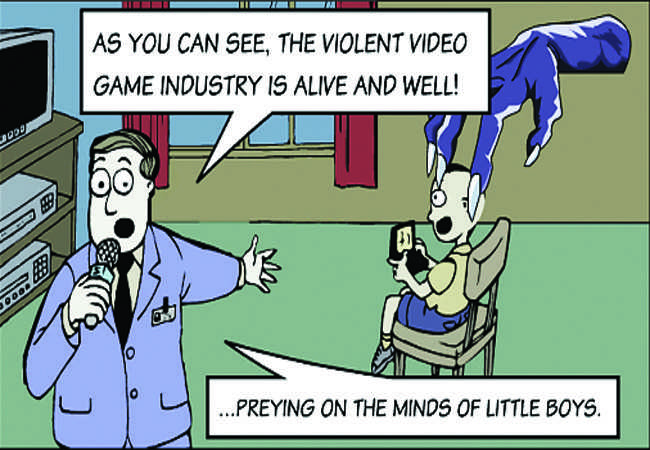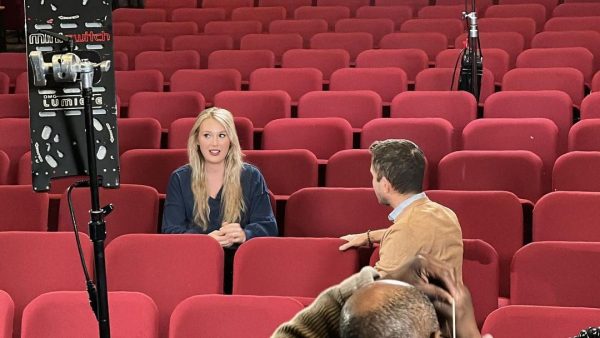The problem with violence
We can scarcely sit through TV commercials without witnessing the fabricated, gory death of a well-known movie actor. Our younger siblings laugh hysterically at Tom and Jerry whacking each other upside the head with baseball bats. We may chuckle at the misfortune of fictional characters, but do we ever stop to think about how exposure to violence might influence us?
In a 2007 poll conducted by Polling Point, 49 percent of people agreed with the statement that violent movies and video games inspire mentally unstable people to commit acts of violence like the shootings at Virginia Tech. In the same poll, 35 percent said they disagreed and 15 percent were not sure.
The facts indicate that the majority of the American public views the violence in our culture as detrimental to a person’s mental health.
If people are conditioned from a young age to enjoy the gruesome slaughter of their enemies, is it surprising that we have the tragedy of school shootings in our society?
I talk about how horrible video games are, but the truth is that I’ve played them myself. Though it was years ago, I still remember playing Grand Theft Auto at a friend’s house. At first I cringed at the image of shooting down civilians and running them over in my car, but eventually I became desensitized to these atrocities and started to enjoy myself.
This is my concern: that children who become desensitized to the scenes in violent video games will turn a blind eye when they see the same scenes in real life. These games are so realistic that it is easy for young children to conflate their virtual lives with their real ones.
Despite their drawbacks, video games are an important part of teenage interaction. Electronic communication — through gaming, texting, social media — is the primary way that teens communicate with each other outside of school.
According to the Pew Research Center, 76 percent of adolescents say that they play video games with their friends, either online or in person. Many of us have gone over to our friends’ houses, bypassed smalltalk and gone straight to the Xbox.
Video games span all ethnicities and socio-economic classes. In this way, they can be a way for people with differences to connect over a common interest.
Personally, I prefer a tamer role-playing game — one in which I can choose a career path and not whether I kill a person in my path. Predictably, a group where violent video games are not as popular is among girls. The female gender tends to favor games that explore the social lives of characters, such as The Sims. The majority of violent video games are sold to young men.
It is not uncommon to see little boys laughing maniacally as they gun down their best friend in Call of Duty, Halo or Counter Strike — all of which are popular role-playing video games. Could this bloodlust, borne by the video games of their youth, translate into a real-life massacre years later?
I would contest that it is highly unlikely that every game-obsessed child will one day become a psychotic mass-murderer. However, I believe that the few people who have violent, pathological tendencies are more easily triggered when they play violent video games.
According to the Pew Research center, 97 percent of American youths from ages 2-17 play electronic games – either on their computer, gaming console or cell phone. Many of these games, especially those targeted toward teenage boys, involve extreme violence and receive a rating of “M” for mature content.
This is a potential problem for the young men of the next generation. Though most of them will never shoot their neighbors or express any explicitly violent tendencies, studies have shown that kids who are exposed to violence are left with a stunted sense of morality.
In February, BBC News reported that teenagers who play violent video games for three or more hours a day without any interrupting human interaction often suffer from a lack of empathy.
Empathy, or understanding and concern for others, is a complex emotion that usually develops in the teenage years. If a teenager does not experience the positive social interaction necessary to learn how to empathize, their moral reasoning can be delayed or permanently stunted.
Many of us would not be alive today if not for the caring power of empathy. As babies we were cared for by our parents, our guardians who fed, clothed and cleaned us. If they had not loved us enough to understand our needs, we would have been neglected.
A society without empathy is a dreary place. Without human connection, life is lonely and unfulfilling. As the future of our society, we must learn to connect with people beyond the gaming console.
The best way to combat this problem is to be immersed in a community where people give and take. Helping others through acts of charity is the best way to learn how to empathize. Interacting with people less fortunate than yourself makes you realize that the world is wider than your widescreen TV.

Sarah Metzel is the current Editorals Editor of The A-Blast. She joined the staff sophomore year as a staff writer.
Metzel was accepted into the Young...










